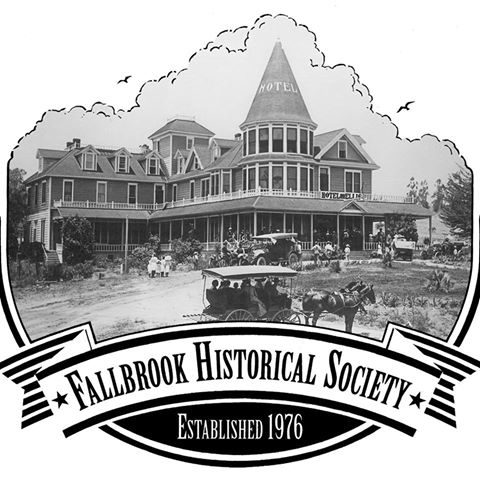Henry Rodriguez was the chairman of the La Jolla Band of Luiseño Indians. Few people made as many important contributions to Fallbrook and to the native communities as Henry Rodriguez.
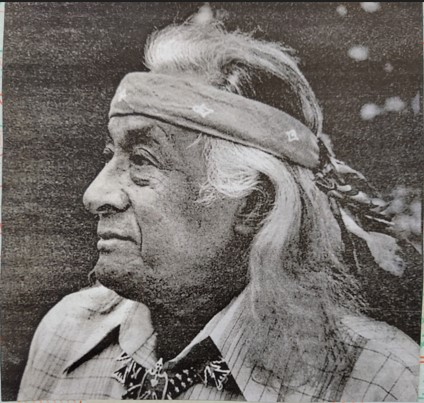
Affectionately known as “Uncle Henry” by his many friends and family, Rodriguez was member and a revered elder of the La Jolla Band of the Luiseño Indians. He devoted his life to preserving indigenous California culture. Rodriguez spoke 3 languages fluently; English, Spanish, and his native tongue, Luiseño.
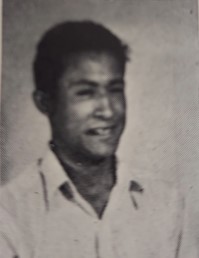
Childhood: Henry Rodriguez was born March 5, 1919 on the La Jolla Indian Reservation on the lower slopes of Palomar Mountain. Henry attended Bonsall Elementary School, usually coming to school barefoot as most of the Luiseño boys did in the 1920s and 1930s. Described as “brilliant” by friends and some of the faculty, Henry was a little rebellious. He would rather explore the trails and wild streams through the pines and cedars of Palomar Mountain than ride the bus to school. Henry was a member of the Class of 1938 at Fallbrook High School. Henry had many interests and often found more engaging things to do than sit through class. He liked music and was a natural athlete. Henry played in the school band. He competed on Fallbrook High’s football and track teams.
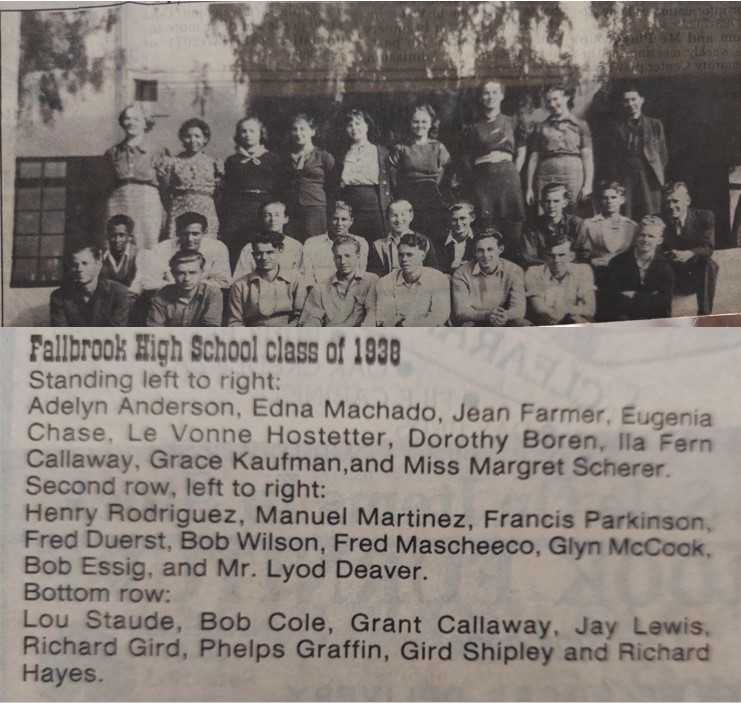
The Warriors: During the Depression years, Fallbrook High School received WPA funds to build a gymnasium (today’s Boys & Girls Club), plus a swimming pool and the football field. With these improvements of the school athletic facilities, Superintendent Potter thought Fallbrook High needed an alma mater song, school colors, and a name for the teams. The student body of 160 chose the school colors. Kurt Reinman the music director led his music students, including Rodriguez, in writing the school Alma Mater. Superintendent Potter asked Henry Rodriquez to organize a committee to gather appropriate names for the school teams. Three names were chosen, two of which are not remembered because Henry only put one name on the ballot. With the vote by the students, Fallbrook’s teams became known as “The Warriors” to honor the large number of Native-Americans in the student body.
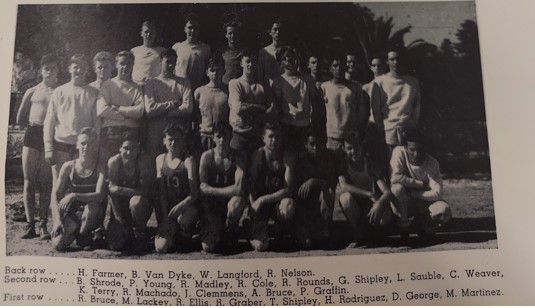
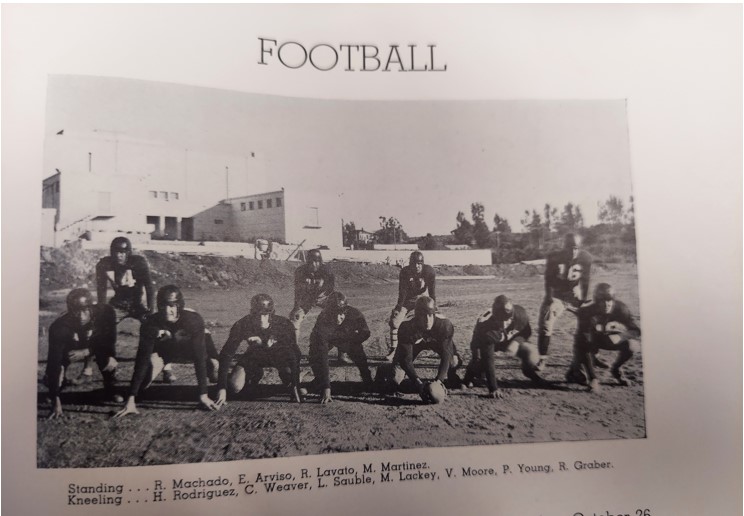
Water Rights: Many of the Luiseño were poor farmers. In the early 1900s, rural Americans were typically low-income farmers, so the Luiseños were made to become farmers too. Relocated to a reservation in the San Luis Rey Valley, they were told to give up their highly developed skills as hunters and gatherers.
Henry became a farmer. After his service in the Army Air Corps during the war years of 1941-1945. He returned to work his widowed mother’s small plot of land.
Rodriguez came to understand that after the federal government had relocated the Luiseños to the reservation and turned them into farmers, the government was selling San Luis Rey water downstream to the cities of Escondido and Vista, leaving the river dry with no water left for the Luiseño to irrigate their crops.
Henry Rodriquez became a founder of the San Luis Rey Indian Water Authority to protect Indian water rights to the river and the tributary streams running through tribal lands. He served as chairman of the Water Authority for many years and after a long fight, won back the Luiseño’s fair share of the water. Rodriguez became a national authority on Indian water rights.
Tribal Council: Rodriguez was elected to the tribal council. As chairman of the La Jolla Band of Mission Indians, Rodriguez was instrumental in establishing the Southern California Intertribal Council, now known as the California Tribal Chairpersons Association.
Henry Rodriguez who talked to the trees, as his mother taught him, learned to talk to and work with, state and federal authorities on environmental protection, and health legislation. Rodriguez was instrumental in bringing healthcare to California reservations.
Dr. Rodriguez: California State University, San Marcos conferred the honorary degree of Doctor of Humane Letters upon Henry Rodriguez in 2001. Rodriguez had served as one of the most significant community consultants to Cal State San Marcos since the university’s inception. For nearly 40 years, as one of the last speakers of Luiseño. Rodriguez spent countless hours recording Luiseño songs and stories for future generations on reel-to-reel tapes that Grossmont College is preserving.
Native American Studies: Rodriguez was an active proponent of Native American education. He served as a board member and consultant to a number of school districts, assisting to develop curriculum with more accurate representation of Native Americans. Rodriguez was significant in the establishment of Native American Studies programs throughout southern California and Arizona. Henry frequently appeared at local elementary schools, where he was a popular speaker and storyteller.
Death: Henry Rodriguez died in an automobile accident on February 14, 2002 at the age of 82. He left behind 5 children and numerous grandchildren. His body was cremated and his ashes scattered on reservation land.
ONCE A WARRIOR, ALWAYS A WARRIOR.
Tom Frew,
FHS Historian
Acknowledgements
- Lorena Harris article for Fallbrook High School 2025 relating the lifelong friendship of her parents Jack and Eugenia Geyer with Henry Rodriguez. They tell the story of how the Warrior name was chosen for Fallbrook High in 1938.
- 1938 High School yearbook on file at the Fallbrook Historical Society documenting Rodriguez’s participation in sports and band.
- San Diego Reader, April 14, 1988, interview with Henry Rodriguez describing his personal life and activities.
- San Diego Union Tribune, June 2001, La Jolla tribal elder to receive honorary degree.
- Henry Rodriguez obituary in Union Tribune, February 2002.
- Cal State University San Marcos, Special Collections.
- Henry Rodriquez family tree by Fallbrook Historical Society on Ancestry.com
